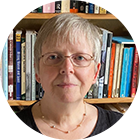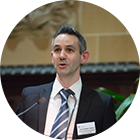This exciting webinar brings UK-based authors of ‘Gender and Sexual Minorities in Disaster Risk Reduction: A Reference Guide’ together with Australian researchers and practitioners to provide the latest guidance and expertise for ensuring that disaster risk reduction efforts include LGBTIQA+ people. Included will be an opportunity to ask questions of the Reference Guide development team at the University College London.
Guest Speakers:
 Maureen Fordham (she/her)
Maureen Fordham (she/her)
Director, IRDR Centre for Gender and Disaster
Maureen Fordham is the Director of the IRDR Centre for Gender and Disaster and has been researching disasters since 1988 and is an expert on community-based disaster risk reduction and vulnerability analysis, focusing on the inclusion of a range of marginalised social groups in disaster risk reduction, especially women and girls. She was a founding member of the Gender and Disaster Network in 1997 and is the Coordinator of its website and activities.
 Kevin Blanchard MSc FRGS (he/him)
Kevin Blanchard MSc FRGS (he/him)
Founder, DRR Dynamics
Kevin Blanchard is an experienced policymaker, trainer and advocate focused on helping to ensure the inclusion, visibility and empowerment of marginalised and hyper-marginalised groups in disaster risk reduction (DRR). Kevin works internationally alongside grassroots organisations, educational institutions, national governments, UN organisations and charities to develop inclusive policy, training & practical guidance. Kevin is also the founder of DRR Dynamics.
 Dejan Greenhalgh-Tomasovic (he/him)
Dejan Greenhalgh-Tomasovic (he/him)
Trainer, Gender and Disaster Australia
Dejan Greenhalgh-Tomasovic is an accredited Trainer with Gender and Disaster Australia (GADAus). Dejan has worked in a range of roles across the disaster management and recovery continuum with a current focus on resilience and recovery policy.
Dejan commenced with Gender and Disaster Australia in 2024, utilising his professional experience and lived experience as an openly gay CIS man to support GADAus extensive qualitative research in challenging assumptions offering evidence-based education, training and resources to address the harmful impacts of gendered expectations in disaster.
 Dale Dominey-Howes BSc (Hons), PhD, FGS, FRGS (he/him/they/them)
Dale Dominey-Howes BSc (Hons), PhD, FGS, FRGS (he/him/they/them)
Professor, Hazard and Disaster Risk Sciences, The University of Sydney
Dale Dominey-Howes is Professor of Hazard and Disaster Risk Sciences at The University of Sydney. Dale is a Geographer with expertise in natural hazards and various aspects of disaster risk reduction and management policy and practice. Dale works at the interface between natural and human systems and considers ‘disasters in terms of coupled human-environment processes’. Dale has, and continues, to work on a variety of hazard types, disaster events and projects across the globe. Dale has undertaken work for organisations including the United Nations, The World Bank, insurance and reinsurance companies, State and Federal government departments and risk/disaster management agencies. Dale is an ongoing advisor to State and Federal disaster and emergency service organisations’ and is Chairman of the United Nations UNESCO-IOC Post-disaster Policy and Protocols Working. Group. Dale’s recent research projects have focused on marginalised communities including sexual and gender diverse people.
 Dr Tegan Larin
Dr Tegan Larin
Research Fellow, Monash University XYX Lab
Dr Tegan Larin is a Research Fellow located within Monash University’s XYX Lab – a team of researchers exploring the intersection of gender and place. Drawing on social and political theory, urban planning, policy, and feminist theory her interdisciplinary research demonstrates a commitment to ending violence against women. Tegan is actively engaged in various projects focused on gender based violence, recently she has worked with Gender and Disaster Australia (GADAus) examining women and gender and sexual minorities and disaster.
 Dr Margaret Moreton (she/her)(facilitator)
Dr Margaret Moreton (she/her)(facilitator)
Executive Director, AIDR
Margaret is the Executive Director, AIDR, and is looking forward to leading and strengthening the reach and work of AIDR to enhance community resilience to natural hazards, across Australia.
Margaret’s first career was with the federal government, working in a range of social policy and program areas and preparing advice for successive governments for more than 33 years.
Motivated by her own experiences during the 2003 Canberra fires, and the 2009 Black Saturday fires in Victoria, Margaret undertook original community-based research focussed on the key factors that contribute to disaster recovery and resilience. She gathered and compared the views of national leaders of recovery, and community members who have been directly affected by emergency events across Eastern Australia.


